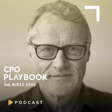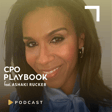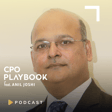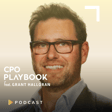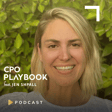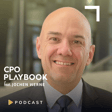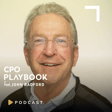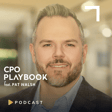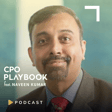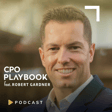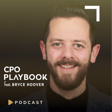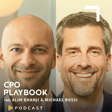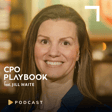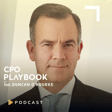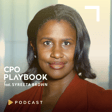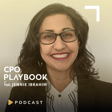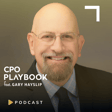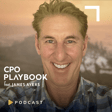Introduction to CPO Playbook Podcast
00:00:04
Speaker
Hello everyone. I'm Felicia Shakiba, and you're listening to the CPO Playbook Podcast. Join me and my guests as we feature insightful conversations with HR leaders, people scientists, and executives from diverse industries and functions, offering valuable perspectives on the future of work.
00:00:23
Speaker
Discover a unique outlook on navigating the complexities of the modern-day working world. Exploring innovative strategies in talent management and corporate culture from the chief people officer's perspective. Tune in to stay ahead of the game when it comes to all things people related.
Challenges in HR Data Leadership Support
00:00:45
Speaker
Getting leadership buy-in for HR data-driven initiatives can be challenging due to factors such as a lack of understanding and awareness among leaders. According to a Deloitte survey, only 33% of HR professionals believe that senior leaders have a strong understanding of HR analytics and its potential impact on the organization. This lack of data literacy combined with concerns about cost
00:01:12
Speaker
Change resistance and competing priorities often make it difficult for HR professionals to secure support from senior executives. As we prepare for a world-renowned HR tech conference in Las Vegas this October, it's crucial to understand how to effectively communicate the value of investing in the tools needed for data-driven HR strategies, using statistics and evidence to highlight the potential benefits and ROI.
Guest Introduction: Brad Williams
00:01:41
Speaker
Joining us today is Brad Williams, head of HR Technology and People Analytics at Northwestern Mutual, a company with nearly 9,000 employees.
00:01:52
Speaker
Brad, thanks for being here today. My pleasure. Thanks for having me. Could you start by giving us an overview of Northwestern Mutual, including the organization size, stakeholders, the design, and so forth? So Northwestern Mutual, we're a 166 year old company. We were founded 1857. So we've been around for quite some time. We're headquartered up in Milwaukee. I think as of
00:02:18
Speaker
Last year, maybe the year prior, officially a Fortune 100 company. We've always kind of teetered right around there, but made it official within the past year to $34 billion in revenue. Most people know us through life insurance, but we do offer a whole host of financial services investments as well. So that's us in a nutshell, 5 million customers, I think.
00:02:42
Speaker
$250 billion worth of assets under management. Fairly large, fairly stable. Midwestern company, we operate from what we call our home office, which is our employee base. And then we have a field force, which is what most customers interact with that are contractors and advisors that work out in the field that are separate from what we manage within our home office here from an employee standpoint.
00:03:06
Speaker
Can you share a specific challenge from your experience at Northwestern Mutual, where you needed to gain leadership buy-in, and what strategies did
Merging Tech and Analytics in HR
00:03:17
Speaker
you employ? Yeah, so I think there is two that are most relevant to my world here. So my role has largely sat in the HR, technology, analytics, insights, and workforce planning space
00:03:32
Speaker
And two things in my three and a half years here that we encountered first are technology team set separate from our data and analytics team within HR and so within a year of my tenure here at and then.
00:03:47
Speaker
I made the proposal to bring those two worlds together and the timing was right because we had a couple of retirement and resignation within the leadership team. But I pitched the idea of rather than two separate teams, technology and data and analytics,
00:04:03
Speaker
to bring them together as part of that as well. I shifted from a largely outsourced HR technology team to bringing that team in-house and bringing the skills, the capacity, the capability within the NM employee base versus outsourcing and having third party support.
00:04:23
Speaker
So those were big shifts that really took a lot of influence and a lot of conversations with leadership across all levels within HR and even beyond to really make that a reality.
00:04:37
Speaker
Who were you collaborating with most? How hard or difficult was it to get leadership's attention? What did that look
Gaining Leadership Support with Logic and Emotion
00:04:48
Speaker
like for you? There's a couple of things that I did, a lot of lessons learned along the way, but a lot of this was, I used kind of, and this is true of a lot of arguments that I make, both logic and emotional argument to the stakeholders that I'm trying to influence.
00:05:05
Speaker
From my perspective, it starts with the top my boss are head of HR, CHRO.
00:05:11
Speaker
and getting his support, getting his buy-in. But honestly, it doesn't end there. I needed to convince my peers to convince even their teams that this was the right thing to do, and both bringing technology and data together, but also shifting to an in-house model from an HR technology perspective. And the analogy I kind of used was, especially on
00:05:35
Speaker
Bringing an in-house model to the HR technology team was imagining we're building a house. And all of our stakeholders, the customer, the person who was getting the house built, we weren't happy. But we felt like we just needed to get the project done. We needed to get the house built. And I had to go and convince those individuals that, hey, let's take a pause. Let's go out and find the right builders. Let me go do that.
00:06:02
Speaker
and I'll find the right builders, I'll find the right general contractor so that we can build the right house and it's going to prevent all these future problems. And so that was kind of the analogy that I use as I went around and convinced because nobody, most of my peers weren't happy with the service levels they were receiving from the third party. And part of that
00:06:23
Speaker
was third parties aren't nearly as invested and also don't have to live with the consequences of many of their implementations or many of their changes that they're making if we bring those resources in house and part of my pitch was for the same amount of money we're gonna get better outcomes work
00:06:41
Speaker
the team's going to be held more accountable because you can follow up directly with them and say, hey, this isn't working like you promised it would. And we can fix that. We can build that. And so it was a very logic based argument to get them on board, but by no means was it easy. But once they saw the vision and having that trust and credibility built up over the first year of my tenure here, I think sold them on making that a reality.
00:07:09
Speaker
I love that you approached your strategy with basically how everybody makes a decision, which is either in the logic camp or the emotional camp.
Transition to In-House HR Tech Model
00:07:19
Speaker
So covering both camps kind of assures that you're going to have some sort of influence, right? But that's exciting. I love that approach. How do you do approach leadership to secure their commitment to this strategic shift of transitioning from an outsourced HR tech model to an in-house one?
00:07:40
Speaker
I really started with my peer network, the folks that were going to be impacted by the work that was getting done because I knew there was going to be a disruption along the way that we were going to have to slowly wean off our third party support while we built and sourced our
00:08:01
Speaker
newly internal team to go out and do that work. And even after we got those resources, there was an onboarding period where they needed to become familiar with NM, with the environment, with the infrastructure that we have, with our strategy, our direction. And so it wasn't you start them on day one and it's smooth sailing thereafter. It was a bumpy road and I went out and made sure.
00:08:27
Speaker
that they were prepared for some of the challenges. But again, keeping the vision in mind and got their buy-in, got their support, and then took that to our head of HR and said, look, I've got my peers supportive of this for the same dollar investment, which I think was the big thing that he was worried about. So for the same dollar investment, we can get better outcomes. We can get things done quicker. We can get things done more efficiently.
00:08:56
Speaker
And I've got all of my peers supported. He gave me the green light to go out and do that. Again, with the understanding that the dollars needed to work itself out. So we had to go out and hire thoughtfully and move that along while also being aware of the spend that we had from a third party standpoint. And there were
00:09:18
Speaker
checks along the way to make sure that we weren't veering off course and that we were still achieving the outcomes that I promised my peer group and my peers. That's so interesting that you started with your peers. And by peers, you mean peers in HR, peers in the business.
Aligning Strategic Changes in HR
00:09:38
Speaker
Yeah, it was largely the peers within our HR leadership team. So most of the work that gets delivered through my team is through our COEs. So think about talent management, talent acquisition, total reward.
00:09:53
Speaker
They're really the drivers of much of the work, although we have partners outside of HR as well. I certainly don't want to position them as less important or less impactful, but they were more aware of the direction, certainly from an HR engineering standpoint, what the impact was going to be to them.
00:10:14
Speaker
But really the disruption that was going to occur was within my peers across our HR leadership team. And so I wanted to get there by and above anybody else. And I think that makes a lot of sense because the HR business partner for their client groups are really the representatives of their business and have that insight to share with you. So that makes a lot of sense. Many leaders have reservations about adopting
00:10:39
Speaker
data-driven HR practices as you experienced yourself.
Autonomy vs. Data-Driven Practices
00:10:44
Speaker
So in your opinion, what are your most common concerns?
00:10:47
Speaker
One of the big things that I've experienced, and first, the thing that I love about the space of HR analytics and HR technology is that there's a lot of white space still in the field. We don't have everything figured out. We're, I think, a little less mature, although very quickly catching up to other analytics functions across other functions.
00:11:10
Speaker
And so that gives you a lot of space to play in, but I think the downside of that is there's trepidation and there's fear among many of your closest allies in HR on what it means to be data-centric, how to use analytics to drive decisions. And I think the biggest fear that I consistently hear, granted it's not always directly stated like this, it's normally an undercurrent, is
00:11:38
Speaker
It takes the autonomy away from the decision making that I'm making in my role. As an HR business partner, you're making judgment calls, you're interacting with humans, which is really hard to put data behind and try to quantify behavior, why people behave the way that they do. And so I think there's an undercurrent of fear that
00:12:00
Speaker
Well you can't just use data to do my job or to make the decisions that i'm making on a day to day basis and my report back is always that it's not a substitution it's surely additive and it gives you another.
00:12:17
Speaker
No pun intended, another data point to use in making those decisions. And if you look at all of the work done in Moneyball and just analytics across sports, you see how that has evolved. And that's really where I see HR analytics going in general is there's this fear that you can't really quantify a lot of these things. And to some degree, that's true. We're not going to be able to quantify.
00:12:43
Speaker
human behavior with the data that we've got today or predict it perfectly, but we can use it to help steer and guide some of the decisions. But at the end of the day, you need a human making those decisions with the information available to them. So that's how I've navigated some of the anxiety and fear that I've sensed working with an HR.
00:13:03
Speaker
I love your analogy with Moneyball. I think I see it so clearly and I'm glad you mentioned it because you re-triggered my memory of Moneyball and how well it fits in this arena. And so when you think about that, you also think about building a skills-based
00:13:22
Speaker
talent culture in a strategic imperative.
Building a Skills-Based Talent Culture
00:13:27
Speaker
Could you describe the steps that you took to ensure that stakeholders saw the value in this approach and then actively supported its implementation?
00:13:38
Speaker
Yeah so like many companies were on this transition to a skills based talent culture and it's been a multi year effort and what i will say is i by no means i'm singularly at the front of the line leading the charge and getting everybody to follow.
00:13:58
Speaker
This is really, and I think about part of the theme already in this podcast is how to build that coalition, how to collaborate, how to bring everybody along so that there's a united front. And that's really what we did with our transition to skills, which we're still in early innings of to go back to the money ball. Always resonates with me is the quote of, if you want to go fast, go alone.
00:14:22
Speaker
if you want to go far, bring others along. And so we're really emphasizing all of the connections, not just within HR, but outside of HR with the business. Because if we want to shift the skills-based culture, we need to understand from an employee perspective, from a manager perspective, what are their concerns? What's in it for them? How do we sell that to them? And how do we really make this
00:14:50
Speaker
impactful and resonate with them and have staying power because a lot of initiatives, and I've seen this before in the skills space where you spring up this skills taxonomy and you do all this great work and you nail it down and it's tied to your job architecture.
00:15:08
Speaker
And then it just kind of fizzles out and doesn't go anywhere nobody uses it for anything and so part of the work that's going on right now is how do we actually create staying power with the shift to skills and how do we really make.
00:15:24
Speaker
a compelling value for employees to buy into this for managers to buy into it and so we're looking at how do we really bring this internal talent marketplace to life and provide career path for employees based on skills that they have skills that they want that's also tied to an M. multi year strategy and the future roles that we need to enable that.
00:15:52
Speaker
And so we're doing a lot of work on not just how do we build the skills infrastructure and how do we create the right taxonomy how to retire to.
00:16:01
Speaker
our job architecture, how do we create the right governance? We're spending even more time on the value prop and making sure that this resonates with the employees, the managers, the business themselves so that it has that staying power. You just said so much. I am digesting everything that you shared because my mind has gone in several directions on the taxonomy and the skills and influencing the business and making sure that they know that this is something for them.
00:16:29
Speaker
And then being able to also bring along your HR peers and let them know that decision making is really a layered approach with data and the day-to-day, your knowledge, the qualitative data, relationships. I mean, it's very encompassing, so it's a lot of rich sharing that you just did. Did you leverage any key metrics to help persuade stakeholders to move forward with
Using Metrics for Stakeholder Persuasion
00:16:57
Speaker
Yeah, we absolutely did. And I will say that I don't know that there was much outward resistance to this. So I don't think it was a hard sales pitch that HR had to go out and say, hey, guys, we really need to do this. I think people intuitively got it in large part because
00:17:16
Speaker
of the things that they're experiencing within their teams, trying to make hiring decisions within the research that they're reading. But a couple of things that stood out to us from an HR standpoint in doing our research and due diligence, a couple of stats were that 73% of high potential employees would leave their job
00:17:41
Speaker
for opportunities that better leveraged the skills that they had. So if we think about huge retention risks and perhaps a little bit of the fear of retaining key critical talent, if three quarters of them or nearly three quarters of them are willing to leave NM to find an opportunity that better utilizes the skills that they have, we need to understand what skills that they have. And we need to make sure that we're fully leveraging them or else we're
00:18:08
Speaker
at risk of losing them. Another piece that rings true at NM, and we found this in the research across other industries and other companies as well, was that more than half of employees say it's easier to find a job externally than it is internally.
00:18:26
Speaker
And part of that, my caveat to that is part of it is because there's just more opportunities outside of any company than there are internally. But usually it's because that internal marketplace really doesn't showcase what are all the opportunities that are available.
00:18:42
Speaker
How can you grow your career, grow your skills to match some of the needs that any organization has? And so that was part of the value prop of moving the skills was to create that transparency. There was a little bit of a.
00:18:58
Speaker
both a carrot and a stick mentality, a carrot in that look at what's in it for the employee base. Look at what's in it for managers. Look at what's in it for us as an employer to be an employer of choice to fulfill our employee value prop to help people grow and develop in their career. But there was also the stick on the other end of most other organizations are doing this. If we don't get on board,
00:19:27
Speaker
We're going to fall behind. We're going to lose top critical key talent. We're not going to be able to understand the skills or roles that we need for the future. And we're going to fall further and further behind. There was both kind of an upside. Here's the carrot. But also here's the risk if we don't. And here's what can happen and the consequences.
Quantifying HR Impact through ROI
00:19:49
Speaker
It sounds like it's also about sharing what's going to happen if we don't do this.
00:19:54
Speaker
Yes. And so how do you recommend HR professionals communicate the return on investments? And that could be to the executive team. It could be to the head of their client group, any leadership or stakeholder. Yeah.
00:20:13
Speaker
The ROI is something I'm very keen on in trying to measure. I think it gets a little challenging within the HR space because you want to find humans, but there's an impact there. And I'm convinced it's not always going to be 100% accurate.
00:20:33
Speaker
But I'm convinced you can do enough analysis and make enough. Directly correct assumptions, prove out your ROI. How much does it cost when you lose an employee between the costs of going out and backfilling and spending recruiters time.
00:20:51
Speaker
hiring managers time on boarding process the risk that other people in the organization then leave as well the contagion effect of attrition there's a cost associated with that so how much is that is that attrition war and attempting to quantify that how much is a bad leader.
00:21:10
Speaker
cost the organization what are the consequences of having that and again there is a lot of things that you can put numbers behind and quantify credit with some assumption but there's also things that qualitatively you can speak to the emotional side of things how much is engagement how much more productivity do you get from employees when they're engaged they're happy
00:21:34
Speaker
they're enjoying the work that they do. That's something that organizations just naturally want. Even if there's zero hard dollars associated with it, you want to walk into your workplace and feel that energy, feel that excitement across your employee base. And so I think looking at things from an ROI perspective and focusing on what is that return, both from a dollar standpoint,
00:21:58
Speaker
as well as from a qualitative standpoint, is important across HR. And I'm convinced that everything that HR does should be quantified. Again, some things may be more challenging than others, but usually if there's a will, there's a way to measure it.
Future Workforce Planning with Skills Data
00:22:15
Speaker
And so what's next from a skills perspective? So one of the things I'm most excited about along our skills journey is really only leveraging some of the information that we're getting on our workforce, the skills that they have, the roles that we have and the skills that are needed for each of those roles, but projecting that forward and kind of tying it to workforce planning. So how do we leverage that information
00:22:44
Speaker
and project that forward and understand what our multi-year strategy is here at NM and what roles we need to fulfill that. What skills do we need? What do we need more of? What do we need less of? And then working to bridge that gap. So how do we upskill our workforce? How do we give them those development opportunities? Who are the employees that are best suited for those development opportunities, whether it's because
00:23:11
Speaker
They're in a role that is easily transitioned to a different role with a couple of skilling opportunities or because they're a high potential employee and we can kind of shape their career path or give them the opportunities. So I think from a workforce planning standpoint, the skills piece really unlocks that and I can't tell you how excited I am to see what the future holds there and how we can leverage that to really be more sophisticated
00:23:39
Speaker
in our planning and also from an employee standpoint, how we can fulfill those value props that we have to employees to grow and develop in their current role as well as the staying to move into the next role and promote and drive their own career. So it's really around how do we identify these high potentials with this skills, data and information.
00:24:07
Speaker
Exactly. And even one of the things in the skills work too is what skills are most important or most impactful? You can have a whole host of skills and most people have a whole host of skills and there's a ton of skills that are needed for any given role in any given company. But what are really the drivers of performance within a given role or within a given individual?
00:24:29
Speaker
and attempting to quantify that and really understand what matters and what do we focus on what skills do we need from employees that are most impactful to the work that we're trying to do so i think it's not just for all the understanding skills what do people have really what are the most impactful skills that people have and how do we make sure that we're capturing that wanna find that growing and developing that.
00:24:55
Speaker
I think the value is very obvious, especially after hearing this conversation.
Leadership Support in Political Environments
00:25:01
Speaker
But sometimes there are political roadblocks. So how do you build support from leadership given sometimes a more political environment?
00:25:12
Speaker
I absolutely resonate with the political environment and unfortunately, as much as I would love to dig my head in the sand on things like that, that's a reality of every single company, every single organization. And so I think it's going to be unique at any given organization, but I think it goes back to the earlier question that we talked through on gaining the
00:25:35
Speaker
buying and articulating, what are all the great things that this unlocks if we do it and do it well? What are the consequences if we just sit on our hands and wait around and don't take action on this? And I think, again, maybe it even ties into the ROI discussion, too. Like, how do we quantify that? And what's the real impact? Because politics are going to exist. And at the end of the day, I'm convinced that if you can make
00:26:04
Speaker
a logical argument, appeal to people's emotion, things are going to get prioritized. That's what it comes down to. It's not necessarily that people don't want to do things, it's that it falls lower on their priority list. And it's just something that, yep, that might sound good in theory, or if we had unlimited time, of course we would do that. So I think part of the argument on
00:26:27
Speaker
politics and gaining buy-in is, how do you move that up the prioritization list? And I think that's where some of the work on quantifying it and being able to articulate what the return on investment is, as well as all the great things that it unlocks from an employee, from a manager, from an employer standpoint, and then again, drawing on the consequences. What happens if we don't do this? And
00:26:53
Speaker
leaving it in the arms of the decision makers. But I think building that coalition, building as much support from as many different stakeholders as you can is probably the best place to start. Brad, thank you so much for being here. I really appreciate everything you've shared. My pleasure. Thanks for having me. That's Brad Williams, head of HR Technology and People Analytics at Northwestern Mutual.
Podcast Conclusion and Call to Action
00:27:25
Speaker
If you like today's podcast, we have more podcasts on innovative HR strategies, talent management, organizational culture, and more, and how to navigate the complexities of modern day HR. Find them at CPOplaybook.com slash podcasts or search CPO Playbook on Apple podcasts, Spotify, or wherever you listen. Thanks for listening to the CPO Playbook podcast. We'll be back with a new episode next time.
00:27:56
Speaker
I'm Felicia Shakiba.
00:27:59
Speaker
If you love CPO Playbook, the best thing you can do to support us is become a subscriber. You can do that at CPOplaybook.com slash podcast. That's CPOplaybook.com slash podcast. If there's an episode you loved, please share it with a friend. And if you have an idea you would like us to talk about or a guest you'd like to nominate, visit CPOplaybook.com slash contact us to suggest an idea.

